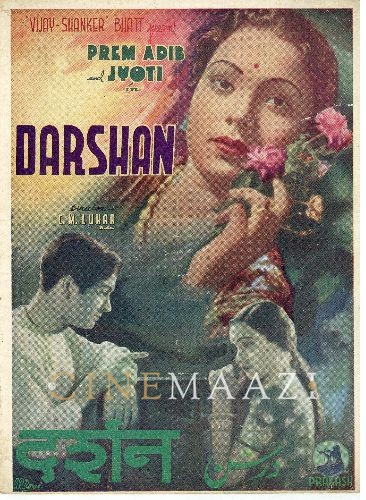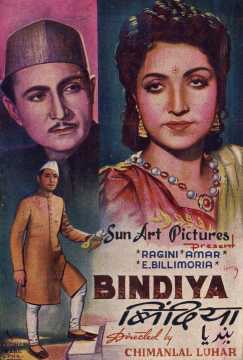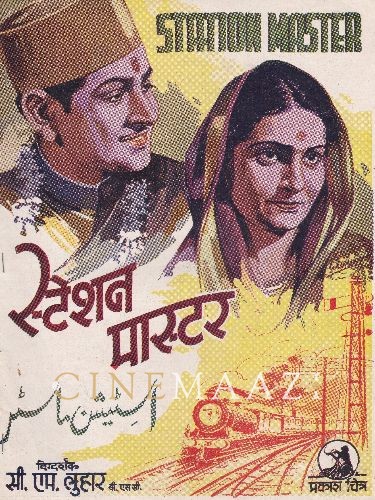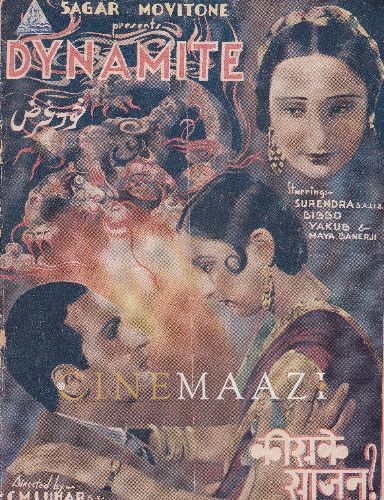This section is for paid subscribers only. Our subscription is only $3700/- for one full year.
You get unlimited access to all paid section and features on the website with this subscription.
Subscribe to read full article
This section is for paid subscribers only. Our subscription is only $37/- for one full year.
You get unlimited access to all paid section and features on the website with this subscription.
Not ready for a full subscription?
You can access this article for $2, and have it saved to your account for one year.
- Release Date1941
- FormatB-W
- LanguageHindi
- Shooting LocationPrakash Studios, Andheri, Bombay
One of life's numerous tragedies is vividly transposed to the screen in a pitiful tale of woe, with an intriguing problem woven around the DOWRY System of Indian marriages and the cursed heritage of the country's Womanhood.
DARSHAN perpetuates a documentary record of this traditional custom and the story is laid in the remote village of Sitapur, which forms part of a wealthy Zemindar's estate, who has a young daughter awaiting marriage with a substantial dowry. Ram Bhajan, the Puraji of Sitapur is also the father of three attractive daughters, but without the prospects of Dowry settlement to join them in the bonds of wedlock.
The eldest consents to an unhappy lot and is wed to an old man fit to be her father in consideration of nominal dowry and his shortly after draped in widowhood. The second is married to a young upstart with half the amount of Dowry unpaid and immediately after the wedding, Ayodhya Prasad the son-in-law, demands the remaining dowry or in default threatens to discard his wife Sushila.
Durga Prasad the new KAMDAR of the village estate who accepted his position on the distinct understanding that his nephew Prakash would marry the Zamindar's daughter with a dowry of Rs. 10,000/- very shrewdly extracted an advance of Rs. 5,000/- as earnest money to seal the marriage contract and utilizes this amount for Prakash to complete his studies in medicine. Prakash adopts his profession and Cupid draws him into a game of romance with Rajani, the youngest daughter of the Pujari.
When Prakash is acquainted with Pujari's domestic affairs, he is swayed with sentiment, and decides to settle Ayodhya Prasad's claim and restore happiness to Sushila.
Prakash's attempt to help Sushila is however frustrated as the Kamdar comes to know of his intentions through his brother-in-law Totaram. Ayodhya Prasad forsakes Sushila and the second calamity is recorded.
Prakash pursues his determination and secretly steals his mother's jewels and delivers these to Pujari. But then the hand of fate intervenes and the Kamdar appears with his men and accuses the Pujari with theft of the jewels. Sushila unable to bear the disgrace leaves her father and sisters and commits suicide by drowning.
Kamdar now hastens Prakash's marriage arrangements but the lad is adamant and flatly refuses to consent to his uncle's wishes and prepares to leave his protection with the determination to refund his Rs. 5,000/-. Prakash decides to marry Rajani without dowry and she consents. He departs amidst scenes of sorrow and tears.
Sushila who was rescued from her drowning fatality, joins a Kathak Mandali and decides to end her wretched life by entertaining the public. Her party reaches Benares and at a charity performance she is discovered by Ayodhya and Totaram. Ayodhya tries to take her life but she escapes and is pursued by her husband who loses one leg in a motor accident. Doctor Prakash and Sushila nurse him back to health and Ayodhya is induced to take his wife back.
The news of Sushila becoming a dancer is conveyed to Durga Prasad, and this last shock converts the Puraji into a Sanyasi and he deserts his daughters in a raging storm.
Kamdar plays his next move and compels the eldest daughter Jagadamba to marry Rajani to old Totaram, since no respectable young man would marry a dancer's sister.
Rajani is prepared for the sacrifice and then the story takes a critical turn and this supreme juncture.
Patience is the mother of virtue and the dramatic termination of DARSHAN will be embodied in a pulsating climax and finally projected on the screen.
(From the official press booklet)

Cast
Crew
-
BannerPrakash Pict, Bombay
-
Director
-
Music Director
-
Lyricist
-
Story Writer
-
Dialogues
-
Cinematography
-
Editing
-
Sound Recording/ Audiography
-
Costumes
-
Make-up
-
Art Direction












.jpg)



